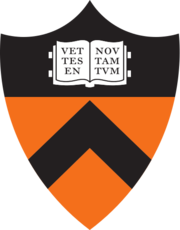Princeton University is a private Ivy League research university in Princeton, New Jersey. Founded in 1746 in Elizabeth as the College of New Jersey, Princeton is the fourth-oldest institution of higher education in the United States and one of the nine colonial colleges chartered before the American Revolution. The institution moved to Newark in 1747, then to the current site nine years later, and renamed itself Princeton University in 1896.
Princeton provides undergraduate and graduate instruction in the humanities, social sciences, natural sciences, and engineering. It offers professional degrees through the Woodrow Wilson School of Public and International Affairs, the School of Engineering and Applied Science, the School of Architecture and the Bendheim Center for Finance. The university has ties with the Institute for Advanced Study, Princeton Theological Seminary and the Westminster Choir College of Rider University. Princeton has the largest endowment per student in the United States. From 2001 to 2018, Princeton University was ranked either first or second among national universities by U.S. News & World Report, holding the top spot for 16 of those 18 years.
As of October 2018, 65 Nobel laureates, 15 Fields Medalists and 13 Turing Award laureates have been affiliated with Princeton University as alumni, faculty members or researchers. In addition, Princeton has been associated with 21 National Medal of Science winners, 5 Abel Prize winners, 5 National Humanities Medal recipients, 209 Rhodes Scholars, 139 Gates Cambridge Scholars and 126 Marshall Scholars. Two U.S. Presidents, twelve U.S. Supreme Court Justices (three of whom currently serve on the court) and numerous living billionaires and foreign heads of state are all counted among Princeton's alumni body. Princeton has also graduated many prominent members of the U.S. Congress and the U.S. Cabinet, including eight Secretaries of State, three Secretaries of Defense and three of the past five Chairs of the Federal Reserve.


